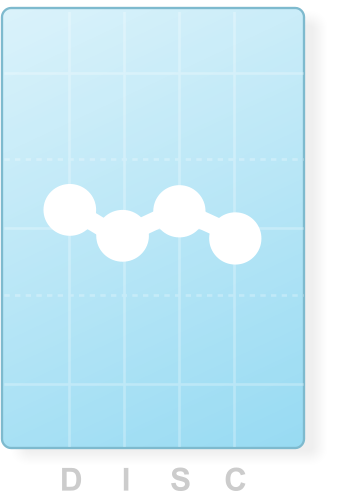Your regular update of news and articles from the world of DISC personality profiling with the Discus solution.

Published: Wednesday 7 February 2024

A typical compressed DISC profile: all four factors fall within the central zone of the graph.
The great majority of DISC profiles show a distinctive pattern of high or low factors that we can use to assess and describe a personality style in detail. Very occasionally, though, an unusual DISC pattern appears: a flat, or nearly flat line across the centre of the profile, with no distinct high or low factors.
A flat profile like this is termed 'compressed', and in this article we'll look at exactly what a compressed profile means, what it might imply about a candidate, and how you can manage a profile like this with Discus.
A compressed profile is technically defined as one whose factors all lie between 35% and 65% on a profile (these important points are marked with dashed lines on most DISC profiles). When this happens, none of the four DISC factors in a profile are sufficiently far from the average to draw many useful conclusions.
Patterns like this tend to be quite unusual, because they take a particular combination of answers on a DISC questionnaire. They imply that a candidate has provided self-contradictory responses, such that they combine to cancel each other out and result in an undefined profile shape.
One obvious possibility in a situation like this is that the candidate didn't clearly understand the questionnaire process. It may even indicate that the candidate intentionally tried to 'sway' the results in a certain direction. In these kinds of situations, we commonly expect to see compressed profiles across the entire series, with Internal, External and Summary profiles all showing a compressed pattern.
As often as we see fully compressed sets of profiles, we can also see situations where just one profile is compressed and the others are more conventional. In other words, the candidate might show a compressed Internal profile but a normal DISC shape on their External profile, or vice versa.
Cases like this can also arise from confusion, but can also imply actual features of the personality style. The suggestion is that a candidate is actually encountering some kind of conflict or uncertainty in a particular area of their life. Delving into the details of these effects is beyond a behavioural system like DISC, but we can take some general impressions, depending on the particular profile involved.
Compressed profiles don't carry as much information about a candidate's personality as a normal DISC profile. In situations like this, then, Discus isn't able to produce as fully detailed a report as usual.
For that reason, where a profile series is fully compressed, Discus won't create the usual automatic profile report for you. Instead, it will display the candidate with a 'Compressed' icon next to their name, and when you select that candidate, you'll be given the option to either create a limited DISC report, or just remove the compressed results at no charge.
Your choice will depend on your particular circumstances, but when a fully compressed set of results appears, the best course of action is generally to organise a retest. If this is a practical option, it's worthwhile discussing the questionnaire with the candidate beforehand, and ensuring that they completely understand how to complete it.
Compressed profiles are rare, but when they do arise you'll need to exercise judgement in dealing with them. There's very little useful information to be derived from a fully compressed DISC profile series, but where only one profile is compressed (Internal or External) we can at least derive some suggestions about the possible cause.